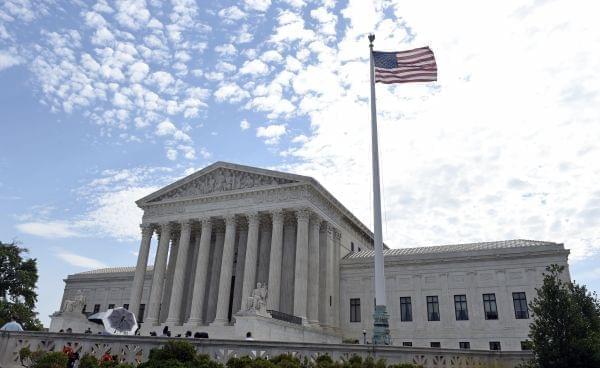Consumer Group: High Court Ruling Against Federal Subsidies Means ‘Death Spiral’

The flag flies in the wind in front of the Supreme Court in Washington, Monday, June 22. (AP Photo/Susan Walsh)
A health care advocacy group is warning of a “death spiral” for the insurance exchanges set up by the Affordable Care Act, if the U.S. Supreme Court rules against subsidies in states that don’t have their own exchanges.
In Illinois, Families USA says health insurance subsidies for some 230,000 people are at stake, including about 154,000 in the Chicago area, and average monthly premiums would nearly triple. In Indiana, the group said about 160,000 would be affected, including about 41,000 around Indianapolis, with premiums being nearly four times what they previously were.
Families USA said a ruling against subsidies in the King v. Burwell case would affect people in every Illinois congressional district, including roughly 8,000 people in Republican Rodney Davis’ district, and another 10,000 in Republican John Shimkus’ district.
Families USA Executive Director Ron Pollack said if a court ruling takes the subsidies away, young, healthier people would decide to go without health insurance, while premiums for older, sicker people would escalate.
But he said Illinois could get the subsidies back by setting up its own health insurance exchange.
Pollack said the federal Health Care.gov website and those of other states should serve as a guide.
“Those kinds of opportunities are being explored, because any state that really is eager to set up an exchange in order to protect their folks who are receiving subsidies," he said. "They’re going to need to help establishing the infrastructure. And I am sure the administration will do what it can to be helpful.”
The idea of an Illinois-run exchange was endorsed again recently by the Illinois Hospital Association, but it didn't have much support in the state legislature last year.
Pollock said another solution is for Congress to revise the Affordable Care Act to explicitly extend subsidies to all states. But he said no proposals that he’s seen from Congressional Republicans would provide a total fix.
Links
- Pending Supreme Court Decision Creates Health Insurance Uncertainty
- Nina Totenberg On The Upcoming Supreme Court Verdicts: What’s At Stake?
- Open Enrollment Period For Health Care Ends Sunday
- What a Supreme Court Ruling on King v Burwell Could Mean For The Affordable Care Act in Illinois
- U.S. Supreme Court Case Could Prove Major Hurdle For Healthcare Law In Illinois
- Families USA website

